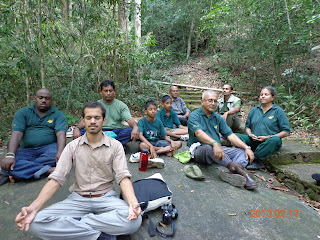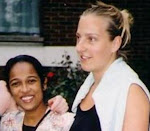Many of our friends, members and supporters got to know that we too got infected by Covid-19. An article written by me in Sinhala medium went bit viral in Sri Lank via social media and electronic newspapers, and many people got to know about our story through that. The best part of it is, many of our friends got concerned about us soon after they read the article as they were not aware of what we went through and asking us to be careful. By that time all over and we were back to normal. Many unknown people contacted me and said it was very useful to read it and be ready for any situation.
Therefore, I am sharing my experience with you all as it might be helpful for some of English speaking people. Here it is....Thank you for reading!!!
It was
Sunday, 18
th of April 2021. Early that morning our second son,
Nipuna, came to see us, and announced that he was feeling feverish! I was
alarmed, as it was the weekend that the New Delhi government announced the
second lock-down due to Covid. Then again, I thought, well, it can’t be Covid;
Nipuna does not go out much- I’m the one who usually goes out and brings home
the groceries. Anyway, I advised him to take paracetamol and to try to sleep
again. In accordance with the advice we had received from the authorities, we
decided to act as though he definitely had Covid. We gave him paracetamol for
the fever, many liquids, such as ginger/lemon tea and warm water, and healthy
food. Getting a PCR virus test was very challenging as the prebooking system
was always full. Somehow, we managed to all get our PCR tests done on the 5
th
day, the 23
rd of April. Results: Nipuna was positive for Covid, the
rest of us were negative. But my throat felt slightly sore, and I knew that I
was going to come down with Covid as well. So, I too, followed the same
instructions given by the World Health Organization and the doctors. This was
the time that Delhi had the highest number of Covid positive cases (around
28,000 per day, with a death rate of about 400 per day). We knew that even
though we needed to go to hospital, getting in to one would be a huge
challenge. Hence, we decided to look after ourselves somehow. One helpful
factor was that we had had our first jab three weeks before. So, we were
feeling positive, and kept following all the instructions faithfully. After 5
days from my first symptom, Thushara became feverish. The next day Henry, our
Indian helper, had a fever, too. Then I knew I should get myself ready to run the
house, even though I still had a fever, as there was no-one else to cook and
feed the family. At least by then Nipuna was clearly recovering, and even able
to attend online classes at school.
How I
managed three active Covid patients (Thushara, Henry and myself) seems
unbelievable when I think about it now. I would get up in the morning, wash
myself, and get ready with new cloths. I would cook some rice and Dhal curry
for breakfast and lunch. Other than this, we had bread, eggs and fruit at home.
So, I fed them whatever they wanted to eat. I started two separate charts for
Thushara and Henry, measuring their temperature and oxygen level every four
hours using the pulse oximeter. Whenever they had high fever, I did this more
frequently. We were told that if the
oxygen level went down to 93% we should contact a doctor. Luckily, their
concentrations both stayed above 96%.
While
managing patients at home, we did the following:
1 We
asked Henry to leave his quarters upstairs, and come and stay in our front
room, so that he was not alone, and we could monitor him closely.
2 I
stopped browsing social media, and put the phone into silent mode. Even before
we got Covid, we were getting so much negative news about deaths, no hospital
beds, corpses lining the roads without enough wood to cremate them, etc. I
wanted to avoid getting scared or frustrated from watching or hearing this type
of news. I asked the others to do the same. I only spoke with my parents and
eldest son (who is in university) to show them that we were all doing great,
even while having Covid. It was only a half-truth, but I never wanted to scare
my parents or son who are so far away from us.
3 When
I worked in the kitchen, I felt extremely tired, but took a lot of rest in
between, and did breathing exercises. These were very difficult, as I felt a
slight pain in the lung area when taking a deep breath. Also, I had severe
coughing. But I kept on doing breathing exercises and meditations, which helped
me to stay calm and breathe comfortably.
4 I
had no smell or taste- but I had to cook and eat. I kept on tasting and
inhaling many fragrances, even though I could not feel them. That way, I
thought, I should keep reminding my brain about these fragrances.
5 I
drank loads of herbal drinks and warm water, and ate lots of fruit in between
main meals. I also took vitamin supplements.
6 Once
only, I got a panic attack when I started thinking about what would happen if
one of us had to seek a hospital, or need oxygen. I started sweating, with
palpitations and blackout. Somehow, I managed to realize that I was panicking
unnecessarily and should not continue thinking like that. I opened the door and
went into my small front garden and started breathing deeply, and thinking
about all the good work I had done so far: planting trees, rescuing animals,
growing organic vegetables, sharing with neighbors, teaching kids about Nature,
looking after stray cats and dogs, feeding birds, etc. Whatever came into my
mind, I started giving the loving kindness and blessing to them. This is Metta
Meditation in Buddhism. It was very useful for helping me to calm myself down,
and in this way I managed the panic attack.
7 We
watched movies- with positive messages only- on Netflix, and watched musical
shows. We rarely have time to watch movies in our normal life, but we
thoroughly enjoyed them during those days.
8 I
mainly passed my day with doing breathing exercises (Pranayama Yoga),
meditation, watching Nature, watering my plants, talking to plants (I was
already doing Horticulture therapy before Covid) and the stray cat who visits
my garden, listening to songs and watching movies, and looking after others.
9 There
were very few friends we answered the phone to, or read text messages from. A
few friends who had Covid before us were very helpful, sharing advice and
keeping our morale up (None of them had three patients at home, so they
understood my crisis.)
10 Somehow, I was out of fever on day
5, and the other two, soon after that. I monitored them very closely until both
were out of the risk period (during which pneumonia was a possibility).
11 We all spent 17 days inside from the
last date of infection, which was the recommended quarantine period for us in
Delhi. Then we slowly started our normal routines. Now when we look back, it
was like a bad dream, and we’ve almost forgotten how we felt during that
period. But what I have to say is that we never got scared about the situation,
but we were very conscious and alert. At the same time, we never cursed or
hated the virus, as we knew it was another living being, and we were fully
aware that there was no medicine. We always stayed positive and lived
consciously in that moment. We did not worry about what would happen tomorrow,
or next week, or how bad it could be (except for the moment I thought about the
situation in such a way as to bring on the panic attack).
The main
lesson we learnt during the Covid-19 infection is: using our mind effectively is
the main factor in helping us to face life positively and stay healthy!
If someone wants to read the Sinhala language article here is the link
https://sinhala.newswire.lk/2021/05/23/%e0%b6%9a%e0%b7%9c%e0%b7%80%e0%b7%92%e0%b6%a9%e0%b7%8a-%e0%b6%af%e0%b7%94%e0%b6%a7%e0%b7%94%e0%b7%80%e0%b7%99%e0%b6%b8%e0%b7%92-%e0%b7%80%e0%b7%90%e0%b6%bd%e0%b6%af-%e0%b6%9c%e0%b6%ad%e0%b7%8a/






.JPG)


%20-%20Copy.JPG)











































